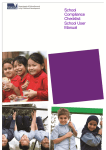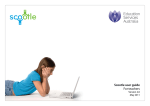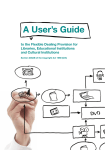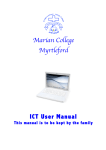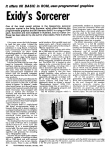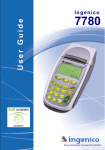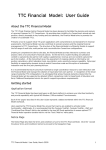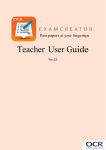Download iPad Parent Information Handbook and User Guide
Transcript
MUELLER COLLEGE Parent Information Handbook and User Guide The aim of Mueller College is to prepare its students for life in a world and eternity by applying Biblical principles through excellent education in a distinctly Christian environment. CONTENTS ! ! ! ! Strategic Direction! Page 3 Why iPads?! Page 4 Technology and Learning Outcomes! Page 6 Preparation Phase! Page 7 ! ! ! ! ! ! How Will The Program Work?! Page 8 Personal Ownership — Benefits! Page 9 College Leasing Agreements! Page 9 What is Needed?! Page 10 INTRODUCTION Effective learning is a culmination of continuous interaction between students, teachers, parents and the community. Technology transforms the role of the teacher from a director of learning to a facilitator of learning, and effective teaching and learning with iPads integrates technology into the curriculum ‘anytime, anyplace’.! The policies, procedures and information within this document apply to all iPads used at Mueller College. ! ! Apps and Textbooks for 2014! Page 11 Transport and Storage at School! Page 12 ! ! ! ! ! Theft and Damage! Page 12 Privacy and Copyright! Page 13 Common Q&As! Page 14 Guide to Troubleshooting iPad Issues! Page 16 Mueller College Rules and Procedures for iPad Use — Overview! Page 16 ! ! ! Consequences for Inappropriate Use! Page 16 Student User Agreement! Page 16 Help and Assistance! Page 17 !2 Mueller College “The integration of technology and pedagogy to maximise learning must meet four criteria. It must be irresistibly engaging; elegantly efficient; (challenging but easy to use) technologically ubiquitous; and steeped in real-life problem solving “! — Michael Fullan !3 Mueller College Why the iPad? The iPad enables anywhere, anytime learning for students, as evidenced in case studies across Australian State Governments (QLD EQ, 2012; NSW DET, 2012 ; Victoria DEECD, 2011). A culmination of high performance, robust build quality, long 10-hour battery life, a bright, crisp HD display, and apps specifically designed for the iPad (rather than stretched smartphone apps) has been shown across schools around the world to effectively increase independent and self-initiated learning among students, student motivation and active engagement, and learning outcomes (IBM, 2012; Pearson Foundation, 2012; Keane, Lang, & Pilgrim, 2012). with features not found on other tablet or laptop options. Power ful apps like iTunes U and iBooks let students engage with content in interactive ways, find information in an instant, and access an entire library wherever they go. Interactivity Students can flip through a book by sliding their finger along thumbnail images of the pages. If they don’t know the definition of a word, one tap takes them to a glossary or dictionary. No longer limited to a single picture to illustrate the text, now students can flick through a photo gallery or dive into an image with interactive captions. They can use a finger to rotate a 3D object and view a human brain from every angle, or have the answer spring to life in an interactive chapter review. “The most effective integration of technology in classrooms is when student-to-device ratios reach 1:1 and technology is ubiquitous” (IBM) Over 300,000 apps The iPad now has over 300,000 apps tailormade for it, and over 40,000 of those are educational apps. These apps range from hands-on anatomy and dissections, movie and song editing, drawing and note-taking, i n t e r a c t i v e t e x t b o o k s , s p re a d s h e e t s , m a t h visualisation, programming, to educational games and so much more. With a bright, backlit LED IPS display, accurate touch panel and stunning high resolution, the iPad inspires creativity and hands-on learning Another advantage the iPad has over traditional laptops and ultrabooks, besides all-day battery life, is the incredibly light weight (300-650g, compared to 1-3KG for some laptops/tablets). Apple also offers best-in-class warranty and support, with local stores at North Lakes and Chermside. Mueller College Why the iPad? (cont.) The iPad has won every international customer satisfaction award since its release (JD Power, 2013), and is the most popular tablet on the market by far. More importantly, it’s the most active in web usage (over 80% of tablet web activity), demonstrating its usability over competitors. A Pearson Foundation survey (2012) found that students believe tablets are just as valuable for educational purposes as they are for personal entertainment. from Apple. Users can confidently download any app from the app store, knowing they are safe. Who else is using the iPad? ‣ Over 95% of Fortune 500 companies (and over 95% of Fortune 100 companies) have deployed the iPad ‣ Over 8 million iPads have been sold to Educational Institutions ‣ iTunes U has passed over 1 billion downloads, with over 500,000 pieces of audio and video material (largest catalog of free educational content in the world) ‣ The Education Departments of NSW, QLD, VIC, WA, NT, and SA have all done extensive studies of the iPad, and found universally increased student engagement, motivation, learning outcomes, and self-initiated and independent learning, compared to any other platforms tested. IBM and Pearson found identical results regarding iPads in the classroom. Security Finally, and perhaps most importantly is how secure the iPad is from viruses and malware. Android now has 99.9% of mobile threats (Blackberry and others making up the other 0.1%) from 2012 (Kaspersky Lab, 2013) i n c l u d i n g t ro j a n h o r s e m a l w a re . W i n d o w s laptops are prone not just to malicious spyware, viruses and trojans but corrupting files and all kinds of frustrating errors. iOS on the other hand, has an App Store curated by Apple, and no ability to side-load apps or for malware to ‘sneak in’, making it the most secure platform on the market (Trend Micro, 2012). And unlike Android tablets, iPads are always able to receive the latest updates in software directly !5 At Mueller College, we aim to prepare students for life and eternity. The 21st century in which our students will live and work is a digital age. This digital age involves rapid and continual changes in the way people share, use, develop and communicate with ICT and young people need to be skilled in its use (MCEEDYA, 2008).! digital technologies have a positive impact upon student learning (Becta, 2009). However, the perception that putting an ICT device in the hands of every student will make them smarter or even more knowledgeable is incorrect (Fullan, 2011). Improved pedagogy and instruction is the driver of improved student outcomes, however technology is an accelerator of this process. When technologies are embedded into teacher pedagogical practice they can improve student engagement and motivation, improve confidence levels, and promote improved opportunities for students to control the construction of knowledge and to learn through collaboration (Becta, 2009). Young people need the knowledge, skills and confidence to make ICT work for them at school, at home and in their communities. The Australian Curriculum acknowledges these priorities through the identification of ICT The introduction of technology will not challenge the literacy and numeracy imperatives, teaching of writing skills and critical thinking that is already evident in the competencies, as well as creative and critical thinking as general capabilities to be developed across all key learning areas. The implementation of a 1:1 ICT program would allow for these objectives to be met through quality teaching and learning practices. There is a strong body of evidence to suggest that Mueller curriculum. One model of teaching which integrates the iPad into existing and renewed teaching practices is the SAMR model developed by Dr. Ruben Puentedura. The SAMR model describes a continuum of integration of technology from substation through to redefinition. Mueller College Teaching and Learning Rationale Mueller College Preparation Phase The College spent 12 months researching the best solutions based on action research, invested in Wi-Fi infrastructure and network upgrades, and provided its teaching staff with 6 months lead-in time as well as regular internal and external professional development and training.! Mueller College made the research-based decision that the preferred device is the Apple iPad. The implementation plan included: ‣ Comprehensive upgrade of College Wi-Fi and network infrastructure ‣ iPad trials in a variety of year levels and subject areas ‣ Introduction of a new Technology specialist subject in Years 5 & 6 ‣ Parent Information sessions on the iPad implementation ‣ Evaluation of Wi-Fi and iPad trials ‣ Integration of iPads into the Teaching and Learning Framework leading into and throughout 2014 ‣ Formation of the Tech Committee comprised of teaching staff to research class-leading practices and classroom implementation of iPads and support other teachers ‣ Future development of a Student Tech Committee to investigate action research via tech projects and initiatives ‣ Staff and Student User Agreements, Parent Handbook (made available on College website) ‣ Purchase and modification of digital citizenship curriculum to be implemented from 5-12 ‣ Purchase of new lockers to increase existing numbers, so that all students have access to safe and secure storage of devices. !7 Mueller College How Will The Program Work? In Semester 1 of 2014, families of Years 7-12 students are encouraged to purchase iPads for the voluntary trial period. In Semester 2 of 2014, families of Years 5-11 students are expected to purchase their own iPads (and necessary case). There is a Student Acceptable Use Agreement (Appendix A) that all students (and parents) must sign for students to receive access to the Internet at school. Students will go through the agreement with their Pastoral Care teachers in the second week of school, and once the agreements are signed and returned, be supplied with their unique Wi-Fi password. Utilisation The iPads are expected to be used across a range of disciplines and learning activities, ranging from biomechanics analysis of Physical Education activities, to multimodal Science experiments recording their methodology and results and dictating over the video, taking notes, online researching, and so on. Students will also utilise their iPads for various homework activities and assessment. All students will still be expected to bring the equipment and books required by their subjects. Daily Expectations iPads will be brought to school fully charged, and taken home each day. During the day, they are to be stored in the lockers (provided) when outside class (e.g. lunch break, sport). The iPad must remain in its case at all times, and students are responsible for their own iPad (see Theft and Damage; Student Acceptable Use Agreement). !8 M u e l l e r C o l l e g e Personal Ownership — Benefits ! Each student is unique, with different learning styles and needs. After much research into other schools who have implemented 1:1 devices, the findings were conclusive that students who owned their own devices took greater responsibility and care of their devices. Greater responsibility for their own learning, from choosing how to organise their apps and set up their information in a personal way, to the daily transport and storage of the devices was frequently observed. The benefit of a parent-owned device allows for full parental control of the device, such as setting boundaries at home, when to use, Internet and media usage, etc. Where there exists a personal financial outlay by the student or family, greater care and consideration also exists. Leasing College iPads There are a limited number of iPads available for lease through the College. The details of the lease program will be provided to all parents in t h e c o m i n g w e e k s ( i . e . e l i g i b i l i t y, c o s t , responsibility). !9 M u e l l e r C o l l e g e What is Needed? The iPads required by the College must run iOS 7 (excludes the iPad 1 st Generation), and preferably be Wi-Fi only models (Cellular iPads must have their simcards removed before being used at school). Students can opt for either the iPad Retina or the iPad Mini Retina, depending on personal preference (the College recommends parents and students physically handle both sizes instore to make an informed decision), and in any size (16GB - 128GB, depending on student needs — a 32GB minimum is suggested to easily fit student videos, apps, textbooks, and content without needing to manage the device storage, as well as for longevity). A sturdy protective case (see Student Acceptable Use Agreement for suggestions) is required for all student iPads (refer to Theft and Damage). At home, students will need access to the Internet via a wireless connection. !10 M u e l l e r Whilst 2015 will see a greater transition to digital, interactive, and multimedia textbooks as well as subject-specific app lists (with possible app “rentals” akin to the textbook hire scheme), this year students will have access to fewer digital textbook versions of their physical counterparts. The eventual goal is that the iPad will replace the need for students to carry heavy textbooks, 2014 will be a transition year (many publishers are still working to create optimal digital textbooks). The iPad should not be viewed as a complete replacement for textbooks, paper and pen, but as another learning tool. C o l l e g e Apps and Textbooks for 2014 Subjects using textbooks will require students to have those textbooks and bring them to all classes. The transporting of large and heavy textbooks around the campus will be greatly reduced through the daily use of student lockers. Required Apps Students must have the following apps installed on their iPads: ‣ Pages* (http://www.apple.com/ios/pages/) ‣ Numbers* (http://www.apple.com/ios/numbers/) ‣ Keynote* (http://www.apple.com/ios/keynote/) ‣ iMovie* (http://www.apple.com/ios/imovie/) ‣ iBooks (http://www.apple.com/ibooks/) *These apps are free if your iPad was purchased after the 30th of September, 2013. In 2014, there will not be prescribed app lists for every subject, but teachers may recommend suggested or helpful apps pertinent to the course. Purchase/downloads of these apps are at the discretion of the parent. Textbooks In 2014, students can access digital versions of some of their textbooks (e.g. Pearson). These can be accessed with a code supplied alongside the textbooks at Textbook hire. A limited number of textbook publishers (Pearson, Nelson, etc.) also offer fully-interactive, rich multimedia iBooks on the Apple iBooks Store which parents can choose to buy if they wish at their own discretion. !11 M u e l l e r February 2014 will see the roll out of a large number of new lockers in the secondary school, to provide every student with a personal safe storage space. Year level areas will be designated throughout the secondary campus, and every student will be expected to take ownership of a locker and access it on a daily basis. In the Primary School, classrooms will have lockable cabinets to safely store the iPads. C o l l e g e Transport and Storage at School As with all belongings, students will be expected and responsible for the care and security of their iPads. Lockers will be a safe storage space for bags and iPads throughout the day when not being used. All students will be required to purchase a case which meets adequate standards of durability, protection, and functionality (see What is Needed?). The College does not have insurance cover on personal items that are brought to school. Students will be transporting their devices in their bags to and from school each day. Therefore we emphasis that considerations be made as to the level of insurance cover, that it meets family expectations. We encourage parents to set guidelines with their students as to how best look after their devices in the transport to and from school. Theft and Damage As with any valuable item, whether textbook, calculator or personal device, there is a chance of damage or theft occurring. Students will be educated right from day one about safe transport, storage and use of personal devices. It is essential that adequate covers are purchased for the iPad, one chosen with safety and protection in mind, not fashion andy how it looks. School lockers will be provided to store iPads when not being used, before school and during lunch breaks and sport. All students are encouraged to use one, and maintain it throughout the year. Any theft that results in damage to a device will be met (costs of repairs or replacement) by the student(s) responsible. If a device is stolen, the iPad can be located via “Find my iPad” (see Appendix B), and Apple now offers an excellent theft deterrent feature free in iOS 7 called “Activation Lock” that prevents the access, use, and erasure of a device without the iCloud password, rendering it useless to the thief (see http://support.apple.com/kb/HT5818). Damage that occurs to a student’s iPad will be determined as to whether it has been wilful or accidental. Wilful damage will be covered (costs of repair or replacement) by the student involved. Accidental damage will be looked at case by case, and appropriate action taken The Head of College will be the final arbitrator on cases involving damage or theft. !12 M u e l l e r Protecting self and others A popular student pursuit is publishing information about themselves or friends in social places like Facebook, YouTube, Instagram, Twitter and the like, but doing this can make them more vulnerable to being approached, groomed or bullied online. Students should assume that anyone or everyone anywhere will be able to see what has been posted. As part of the decision to post something, students should consider how they would feel if: ‣ It is seen by teachers or the Head of College? ‣ It is seen by my parents or guardians or other relative? ‣ It is seen by my friends or other Mueller College students? ‣ It is seen by a stranger who may want to find me in real life? ‣ It is seen by the person it has been posted about? ‣ Would what is being posted be said face to face? Students need to be reminded that this checklist applies whether settings are public or private. They also need to be reminded that once something has been sent, control of that has been lost, it cannot be retried, there will always be a record of it, and it may be passed on or re-shared with a wider, unwanted audience. Protecting how you use the College Internet Once the Student Acceptable Use Agreement has been signed and returned, students will gain access to the College Internet. Use of this Internet access requires responsible behaviours and use by students. Being online can sometimes give students a false sense of anonymity— that they are able to say or write what they like or that their words would never be said to someone’s face, and that what they search for and view is private and no record is kept. All use is monitored and inappropriate language, searches or sites visited can be traced to the user. Copyright Parents/guardians must certify that all content stored on the device is compliant with copyright law and regulations. All content including but not limited to files, photos, videos and music must remain appropriate, as deemed by the College, at all times. The College retains the right to review the c o n t e n t o f a n y d e v i c e re g i s t e re d u n t h e S t u d e n t A c c e p t a b l e U s e A g re e m e n t ) . h t t p : / / www.smartcopying.edu.au/information-sheets/schools is a helpful resource in regards to Australian Copyright for school students C o l l e g e Privacy and Copyright When can students bring their iPads to school? The beginning of Week 2, Term 1. Internet access will be provided once the Student Acceptable Use Agreement is thoroughly read and signed. Which year levels will be required to use the iPads? Years 5-11 will be required to use the iPads by Semester 2, 2014. Year 12s can choose if they wish to purchase one or not. How much will it cost to lease an iPad and am I guaranteed one? The lease program details will be released in the coming weeks, and there is a limited number of iPads available. Will iPads replace books? HoDs and Year-Level Coordinators will determine in consultation with the Heads of Sub-Schools and Head of Curriculum whether a particular subject has a suitable digital book. Publishers are creating digital material and Mueller College is in the process of reviewing these as they are released to ascertain their suitability. This year, the textbook/iBook is under study by all of the departments. What if our family doesn’t have a Mac at home? The iPads run independently of Windows PCs or Macs, but can also sync to either a Windows PC or a Mac easily. The iPad doesn’t have a keyboard or Microsoft Word— how can my child be skilled for jobs outside of school? Students are digital natives, many growing up experiencing touch-based technologies first, and keyboard+mice combinations second. The iPad does support a plethora of bluetooth keyboards and keyboard docks and cases in many forms. Whilst Microsoft are yet to release Office for iPad, Apple offers excellent (free) apps for document design, spreadsheets, presentations, and other productivity and creative apps. These support exporting to Office file formats. My child tells me they have to complete all of their homework using the Internet on their iPad. Is there a limit to iPad use at home? As the parent, you have the final say in how the student uses the iPad at home. Teachers will set a variety of learning activities (some of which may involve the iPad). Should you have any concerns, please contact the teacher directly. Will reading books off my iPad hurt my eyes? The most recent, peer-reviewed studies suggest that there is little difference in read on a highresolution device (e.g. iPad) and a traditional book. Moderation is essential with any persistent focusing. C o l l e g e Should I know my child’s password? Yes. It’s important that you have executive control of the device, even if it is a gift or your child used their own money to pay for it. M u e l l e r Common Q&As Is it expensive to charge the iPad every single night? The average cost of charging an iPad is $1.36/year (approximately 12kWh every year). This is cheaper than a compact fluorescent lightbulb at approximately $1.61/year, and a desktop PC which is approximately $28.21/year. My child already has a portable device— why do they need an iPad? Refer to Why iPads? on page 4. Essentially, having the one device provides uniformity of platform, provision of core apps, in-school support, familiarity for teaching staff, and security, as well as warranty support. What if we don’t have Wi-Fi at home? Homework can still be completed, but for some tasks, students may need to think ahead of time and plan their schedules depending on the activity. Do you expect an increase in cyberbullying? No. The iPads provide us the opportunity to guide your child to become a responsible digital citizen through the L and P-Plate programs. What technical support will be offered at school? The IT Helpdesk will be available during morning tea and lunch breaks to help with student network or iPad issues. Anything related to hardware should be addressed at the Apple Store at Chermside Westfield (http://apple.com/au/chermside/), or via AppleCare (1300 321 456). What if my child forgets to bring their iPad to school, or the battery runs flat? The Student Acceptable Use Agreement states that it is the student’s responsibility to remember their iPad, and also have it fully charged when they bring it to school. Most 1:1 schools have found this is not a significant problem, however teachers will have an alternate activity using pen and paper. There will not be any charging stations available for students. The iPad battery is designed to provide over 10 hours of continual use. Can my child have their own background wallpaper? Yes, as long as it is appropriate (see Student Acceptable Use Agreement). Can my child print from their iPad at school? No. They must email their school email account, or save the file to their H:\, and print from the designated Mac labs during the class they are in, or during their lunch break, as per College policy. C o l l e g e Another student bumped my child, and the iPad screen was damaged. Who pays the repair/ replacement cost? The College treats each incident case-by-case. A student who wilfully damages another student’s iPad is liable for the full repair/replacement costs. Accidental damage is at the discretion of the Head of College. M u e l l e r Common Q&As (cont.) Basic Troubleshooting: http://www.apple.com/support/ipad/assistant/ipad Service and Warranty Information: http://www.apple.com/support/service To organise repairs, quotes, and replacements for broken screens or other damage, either call AppleCare (1300 321 456), or book a Genius Bar appointment via the Apple Store app, or online at http:// www.apple.com/au/chermside. To create an Apple ID, or enable parental controls, see Appendix B. ! Mueller College Rules and Procedures for iPad Use ‣ iPads are not to be used for “free time”. Students are not to use iPads without direction and direct, constant teacher supervision ‣ iPads remain closed until the teacher instructs use ‣ Students are not to use headphones or listen to music during class unless to achieve a learning activity (e.g. FTV/ITS). Music is not to be used for individual study. No movies are to be watched unless they are a curriculum resource and students have been instructed by the teacher. ‣ Students must only use the College Wi-Fi ‣ iPad screens must be easily visible to the teacher ! Consequences for Inappropriate Use ‣ Teachers are the final authority in the classroom ‣ Teachers have the right to confiscate iPads for set periods of their lesson time ‣ Teachers have the right to remove student iPad privileges for future lessons ‣ Teachers have the right to check any student iPad Student Acceptable Use Agreement The use of technology at Mueller College is a privilege, not a right. This Student Acceptable Use Agreement is provided to make all users aware of the responsibilities associated with efficient, ethical, and lawful use of technology resources. If a student violates any of the Student Acceptable Use Agreement outlined in this policy, privileges may be revoked, and the appropriate disciplinary action taken in line with the College Behaviour Management Policy. The procedure and information within this policy document apples to all iPads used at Mueller College, including any device considered by Administration to come under this policy. Teachers may set additional requirements for use in their classrooms or within their subject area. C o l l e g e Apple iPad Guide:http://www.apple.com/support/ipad M u e l l e r Guide to Troubleshooting iPad Issues ‣ Downloading, deleting or reinstalling apps ‣ Restarting of the device ‣ Changing or resetting passwords ‣ Setting up and managing Webmail ‣ Setting up and managing File Browser ‣ Isolating sources of concern ‣ Charging devices, should the battery be low Where a student’s needs cannot be met, further student support is available through accessing the IT Helpdesk. During Term One, support during school hours will be available to students during lunch and recess breaks. We will reassess the ongoing hours of support services after the rollout begins. After school hours: see Guide to Troubleshooting iPad Issues on page 16. Mueller College has partnered with Northside Christian College in assisting parents who may feel limited in technological experience or knowledge and illprepared to take on the challenges that accompany the introduction of electronic media, by having access to a website called e-Quipped. e-Quipped is a resource primarily designed to foster the partnership between school and parents. You can access this resource at http://e-quipped.com.au. The permanent drop down pages in the e-Quipped menu provide background information to the Internet, cybersafety, parenting and more.Have you ever wondered what to do about cyberbullying or need an interpretation of the acronym, MMORPG? Perhaps a sample Home Internet Usage Contact would help negotiate media allowances in your home. You’ll find one for your use under the heading, Cyber Parenting. Mueller College will be looking at a host of options throughout 2014 and beyond to keep parents and families informed and in-touch with digital technology use in school. Initiatives such as parent information evenings, afternoon workshops, etc. will be conducted throughout the year. C o l l e g e While developing skills in the classroom, students will become familiar with a variety of troubleshooting skills. By engaging in curriculum that focuses on the safe and responsible use of their device, we foresee that students will develop a sound understanding of how their device works, and become somewhat self-sufficient in its maintenance and care. Through practice, students should become equipped in the following skill sets: M u e l l e r Help and Assistance

















